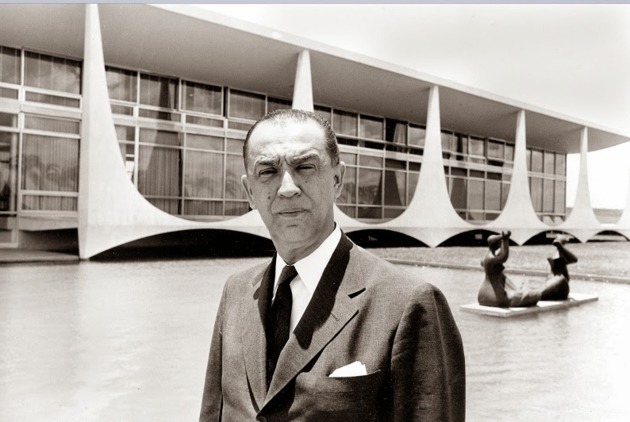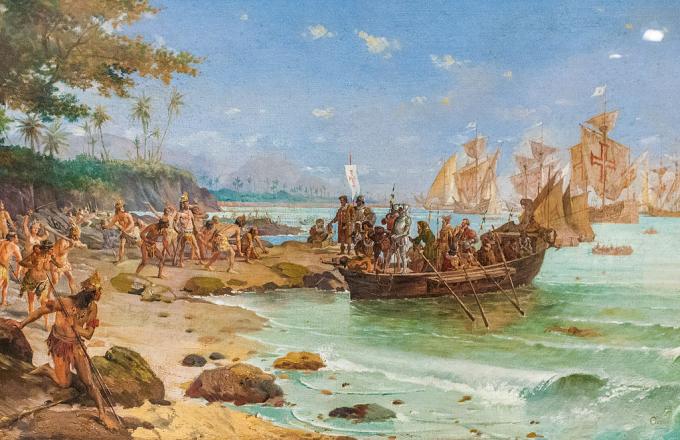Juscelino Kubitschek de Oliveira (1902-1976), known as JK, was a doctor and politician from Minas Gerais.
He was president of Brazil from 1956 to 1960, whose time is remembered as a time of optimism.
Biography
Juscelino Kubitschek was born in the city of Diamantina, Minas Gerais, on September 12, 1902.
Born into a humble family, he studied at the seminary in Diamantina, where he completed a course in humanities.
In 1922, he entered the Medicine course at the Federal University of Belo Horizonte, finishing in 1927. He then studied surgery in Paris in 1931 and trained at the Charité Hospital in Berlin.

JK's Political Career
He entered politics at the hands of the federal interventor of Minas Gerais, Benedito Valadares, where he served as his chief of staff.
In 1934, he was elected federal deputy, but lost his mandate due to the 1937 coup, which would establish the new state.
Between 1940 and 1945 he was mayor of Belo Horizonte, where he carried out important works such as the Pampulha complex with projects for Oscar Niemeyer.
With the deposition of Getulio Vargas, new elections are disputed and Eurico Gaspar Dutra is elected president.
In turn, JK is elected federal deputy and participates in the drafting of the 1946 Constitution.
In 1950 he was elected governor of Minas Gerais. During his government in the state, he prioritized the binomial “energy and transport”. In this way, he created CEMIG (Central Elétricas de Minas Gerais) and built five plants for the production of electricity.
presidential election
On October 3, 1955, Juscelino Kubitschek won the elections for president and João Goulart was the vice president.
JK was elected by a coalition between the Social Democratic Party (PSD) and the Brazilian Labor Party (PTB), parties of Getulista origin. He assumed the presidency on January 31, 1956.
Upon assuming power, Juscelino Kubitschek established the motto of his economic policy, promising fifty years ofprogress in government five.
The Gross Domestic Product (GDP) Brazilian grew on average 7% per year. In addition, the per capita rate increased at a rate four times faster than the rest of Latin America.
After leaving the presidency, he succeeded Janio Quadros and he would be elected senator for the state of Goiás. Like 64 Military Coup and the publication of the AI-1 that revoked the mandates of politicians considered a threat to Brazil, JK withdraws from Congress.
Death
Later, he decided to form the Frente Amplio that brought together renowned politicians against the military dictatorship such as Carlos Lacerda.
However, the project ends tragically. Juscelino Kubitschek de Oliveira died on August 22, 1976, in a car accident while traveling from São Paulo to Rio de Janeiro.
JK government

The JK Government is always remembered as “the golden years” in Brazilian history.
This is due to the developmental euphoria, which consisted of encouraging the country's economic progress by stimulating industrialization.
Likewise, the optimism came from the construction of Brasília, the country's new capital, from bossa nova and from the first World Cup conquest in 1958.
Target Plan to Develop Brazil
The global coordination of the JK government's economic policy was based on the Goals plan.
Presented in the electoral campaign, the plan defined the main objectives to be achieved, grouped into five sectors: energy, transport, industry, education and food.
In an era of cheap oil, the Plan of Goals opted for road transport. 20 thousand km of highways were built, the majority with private national capital.
Oil production jumped from two million barrels in 1955 to thirty million in 1960. The production of steel, which was 1 million and 150 thousand tons, reached 2 million and 500 thousand tons in 1960.
In the durable consumer goods sector, numerous automobile and truck factories were installed, such as Mercedes Benz, Volkswagen, Willis Overland, General Motors and Ford.
Inflation and External Debt during the JK Government
To fund the modernization of Brazil, JK had to resort to foreign capital.
Thus, sectors such as the cigarette industry, electrical material, chemical products, pharmaceuticals, electricity, registered a strong increase in the presence of multinationals.
The domain of foreign capital went from 80% to 90% in the national economy. These factors contributed to the increase in inflation which, at the end of the government, reached 25% a year.
The growth of foreign debt worried foreign creditors. Thus, the International Monetary Fund (IMF) required the government to adopt a recessive policy, with a reduction in emissions, so that Brazil could receive new loans.
JK refuses to accept pressure from the IMF and breaks with the IMF temporarily.
Juscelino's term came to an end amid growing economic difficulties. Inflation and the high cost of living resulted in numerous strikes, especially in São Paulo and Rio de Janeiro.
Construction of Brasilia

THE Brasilia construction it is perhaps the most visible legacy of the JK government.
The transfer of the capital to the interior of Brazil required a large amount of human and financial resources.
The inflationary process was also fueled by the expenses of the works in Brasília, which opened in 1960.
Curiosities
- Juscelino had a habit of taking his shoes off at any meeting. The fact was the delight of photographers who sometimes caught him with only his socks.
- One of JK's favorite songs was the song 'Peixe-Vivo', by Milton Nascimento, which was played at his funeral.
- All over Brazil, streets and avenues are named after Juscelino Kubitschek. The house where he was born in Diamantina was also transformed into a museum and in Brasília there is the JK Memorial, which gathers the president's objects and documents and where he is buried.
Sentences
- "I believe in the final and inexorable victory of Brazil, as a Nation."
- "Forgiveness is the mark of greatness, especially when you have a higher goal in mind."
- "The optimist can make mistakes, but the pessimist starts to make mistakes..."
- "Let us leave to the forgetfulness and judgment of history those who did not understand and did not love this work."
- “The creation of Brasília, the interiorization of the government, was a democratic and irreversible act of effective occupation of our territorial void”.

